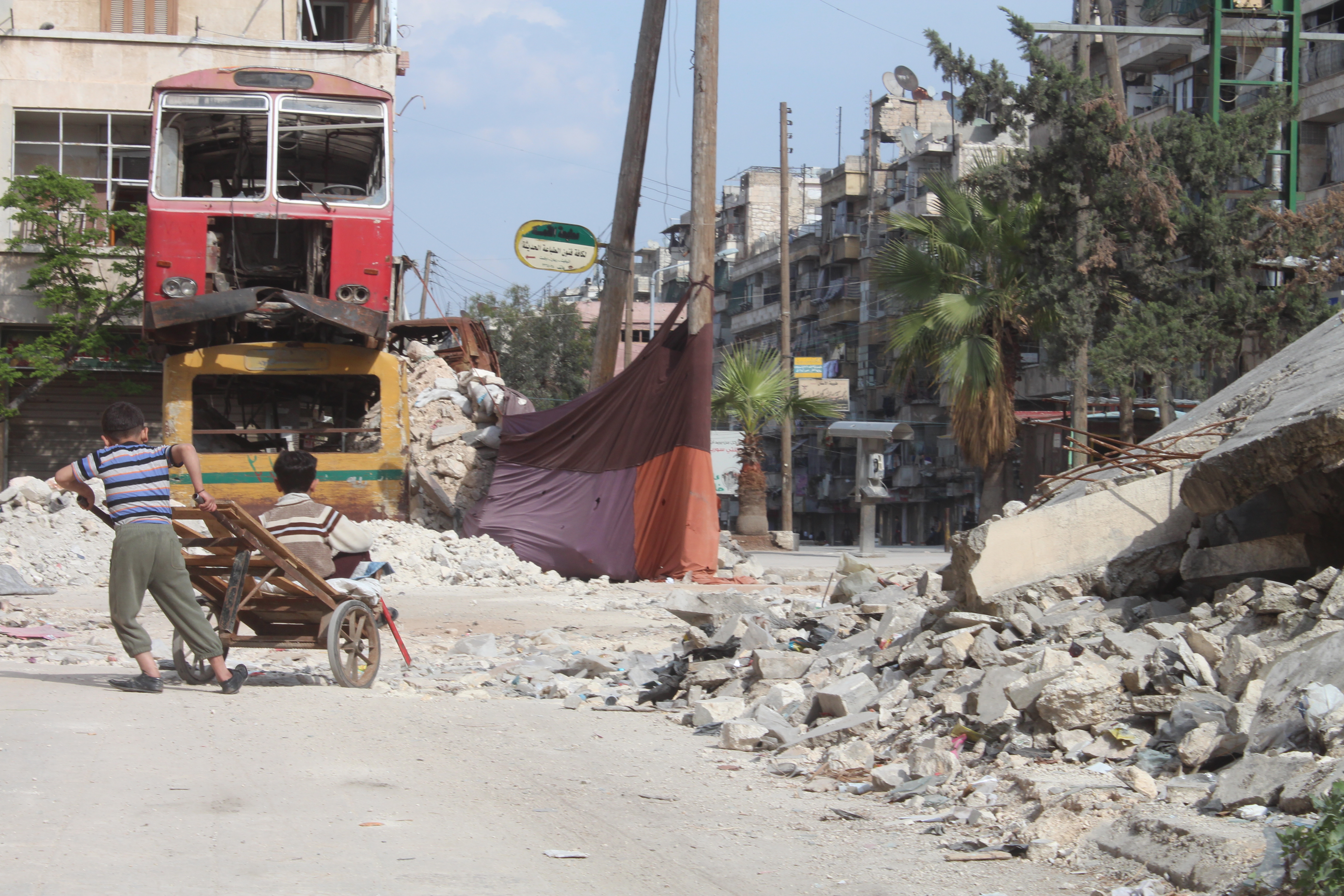At the Mercy of A Sniper

As I stepped out of my house in Jisr al-Abyad neighbourhood early in the morning of June 17, 2012, I felt light with optimism.
I was due to take my exam in first aid at eight o’clock, and I had been working very hard to make sure I passed so I could obtain my official certificate. The award would grant me admission to another six-month course, which would qualify me to become a nurse.
By seven o’clock I was at the al-Adawi bus stop, where I could get transport to take me to my destination in Eastern Ghouta.
I joined the small crowd of people waiting and looked around me. Most of them were carrying books; I realised they were secondary school students on their way to school to sit their final exam.
The minutes ticked by with no sign of the bus, and we all became increasingly anxious. Our route was full of government checkpoints and any delay would jeopardise our chances of arriving on time for our appointments.
We all stood with our eyes glued to the end of the road, squinting to see if the bus was on its way. It finally arrived, but it was half-an-hour late.
We scrambled on board, squeezing against one another so we could all fit in so that no-one would have to wait for another bus.

Our journey to Eastern Ghouta was punctuated by one checkpoint after another. Soldiers manning the checkpoints demanded to see our ID cards to make sure that none of us was wanted by the regime.
Our distress increased each time we were stopped. One girl got so upset she burst into tears. She told us that her exam was due to start at any minute and so she would not be allowed to sit it.
The girl was so distressed that a woman on the bus took pity on her.
“Stop crying,” she said. “Don’t worry. When you get to school tell them you are a relative of mine.”
She gave the girl her name and told her she was an exam inspector, assuring her everything would be ok.
We finally reached our destination after an exhausting trip. I was already late for my exam so I decided to accompany the young girl to her school. I couldn’t leave her alone in the state she was in.
By the time we reached the school gates, she was half-an-hour late for her exam and was refused admission. We gave the man at the door the name of the inspector we had met and pleaded with him, but he would not change his mind.
I began arguing, which drew the attention of the exam director and his deputy. They came out to see what the fuss was about and I tried to persuade them to allow the girl in, but the director arrogantly refused.
Luckily, his deputy turned out to be a kinder soul. He took his senior aside and whispered something to him, then came back to us with a smile on his face and invited the girl in.
She ran into her school, weeping. I left, hoping I too would be lucky.
I walked as fast as I could towards my exam centre, wondering what would happen.
Just as I was crossing a street a terrifying sound rang out nearby. A sniper had fired a bullet at me.
I froze. An elderly man shouted out to me to run, but I couldn’t move.
A woman appeared out of nowhere, grabbed me by the hand and dragged me to safety. We both took cover behind a tall building.
I was in complete shock, so she slapped me to bring me back to my senses. When I recovered I began to apologise to her and thank her over and over.
That woman saved my life; the snipers’ second bullet would have undoubtedly killed me.
I looked around me not knowing what to do. I was far too late for my exam, but how would I get back home?
The sniper shot was followed by a barrage of gunfire. It wasn’t safe to venture out onto the streets again.
My companion and I remained hidden for around two hours. When a gradual lull engulfed the area we slowly crept out and rushed straight into the building. We both knew it was still too risky to leave the area.
We walked up the stairs knocking on different doors. One woman opened her front door and when we explained what had happened, she invited us in and made us a cup of tea.
We stayed at her house for another four hours until things had calmed down outside. When we heard cars driving down the street again we thanked our host and left, each going our separate way.
As I stepped out onto the street again, I felt that I was at the mercy of the sniper again. Would I survive?
I gathered what was left of my courage and ran as fast as I could. My life depended on it.
I was so terrified I kept running even after I had left the area, all the while thinking: how could the residents of this neighbourhood live under the terror of this sniper? The fear I suffered for that one day was part of their daily life.
Maram Saad is the pseudonym of a Damascus Bureau contributor who is displaced and lives in Damascus. The 24 year-old is a media activist and first-aid volunteer with the Red Crescent. One of her worst experiences was tending to her injured father in 2014 who later died in her arms.
Read the Arabic version of this article here
